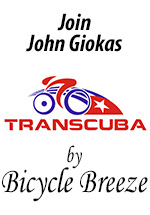December 6/05 8:13 am - Interview with CCA's Outgoing President: Bill Kinash
Posted by Editoress on 12/6/05
Bill Kinash served as the President of the Canadian Cycling Association (CCA) during the three year period which ended one week ago. Arguably, this was one of the most difficult periods in recent memory for the CCA. The organization went through a change in governance structure, a change in management structure, the 2003 World Championships, a new Director-General (appointed just prior to Kinash's term), and his subsequent replacement, financial difficulties (due to accounting irregularities), the loss of a number of staff members and the subsequent new hirings.
We spoke with Bill Kinash late last week, as he reflected on his 13 years with the CCA Board, and on his new role as Past-President.
Canadian Cyclist - To be honest, it was a surprise when we found out that you had lost the election for President (defeated by Pierre Blanchard, whose interview was published yesterday). Any ideas on why it happened?
Bill Kinash - It was a surprise to me too! Everything has been going so well this year; the first year that everyone has been working so well together. To be honest, I probably got complacent; I didn't really do any campaigning for the position. This is the first time I've had a chance to slow down, this last six months, and it probably wasn't the best time to do it, in hindsight.
I didn't find out until Saturday morning (November 26th, the day before the AGM) that there was anyone else running, and I just ran out of time to talk to all the delegates. It was very disappointing, really heartbreaking after all the work the Board has done in the last three years.
CC - It was a difficult time. What stands out particularly for you?
BK - The replacement of the (Director-General), that was our number one accomplishment. There were a lot of good people (at the CCA office), but they were demotivated, we lost a very good marketing person (Fiona Morrow), others were near to leaving. There was no clear picture of the budgets, no access to them ... it was a difficult time.
I think we did really well with the cards we were dealt. 2003 was the hardest - we didn't have staff for both the Worlds and the Association, but we had to cope. That was also the year of transition to the new governance model. But we moved fast after the Worlds were over, by the end of the year we were already working (on removing the Director-General).
2004 was the Olympics, and there was not a lot of wiggle room during an Olympic year! But we started the hiring process in September, right after the Olympics. The finances were going downhill - we had difficulty getting at them, so we had to bring in some outside people. Basically, we cleaned house.
2005 was when we finally started rebuilding, starting with hiring Steve (Lacelle - Chief Operating Officer). I thought we moved as quickly as we could, under the circumstances. At the time, there was so little capacity in the office to do what needed to be done.
I can hold my head high over what we accomplished.
CC - Given the tremendous changes taking place, what do you think hurt you with the voting delegates? Was it Pierre's (Blanchard) international experience? Possibly that they didn't know what was going on in the background?
BK - I think the international card was part of it. They (delegates) may have misunderstood how much preparation we did at the international level, the discussions that we had with (Hein) Verbruggen and Pat McQuaid.
I think you could be right about the background stuff - we were mired in so many behind the scenes issues that I didn't get as much of a chance to be (a visible) President, or even to enjoy it! Not everyone knows what efforts were being made in the background.
But I have to say that I'm positive Pierre has the skills necessary to be President.
CC - You stay on the Board as Past-President. Will you be taking an active role?
BK - I have no intention of leaving our sport; I'm starting to think about running a year from now for the Board (as a Director at Large). I don't believe you have to be the top dog to contribute.
I'd like to contribute to a review of the governance structure that we now have in place and, going forward, the new LTAD (Long Term Athlete Development) model that Paul Jurbala presented (at the AGM) is excellent, but needs implementation. BMX is a challenging area as we move towards 2008. I think I probably spent more time on this sector than any other. It is a totally different demographic (than cycling is used to) - there is competition with the ABA (a private BMX association), and parents running things instead of clubs, teams, athletes. The strategic plan that has been developed is a living document, which needs to be updated also, so there is lots to do.
CC - So, you sound pretty optimistic.
BK - We are working towards what I believe will be a world class cycling organization by 2012. I'm happy to see that we have more staff involvement, more professionals making decisions, rather than volunteers. Marketing is another area where I think that we will see a lot of growth.
I think we will have a really good three years coming up, and the seeds that we have planted now we will see start to bear fruit by Beijing.
CC - Do you have anything else to add?
BK - Yes, I would like to especially thank the Board, CCA staff, the provincial presidents, and our consultant Rose Mercier, for all of the support they've given me over the past three years. This past year was the most gratifying as we're finally all working on the same page. The Board has been super to work with. And I have been so pleased by the positive attitude and enthusiasm now coming out of the office and from the provinces.
| Return to Canadian Cyclist homepage | Back to Top |





